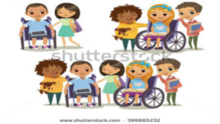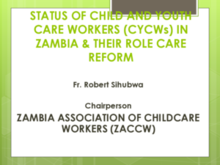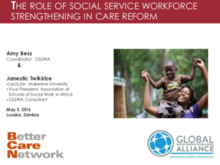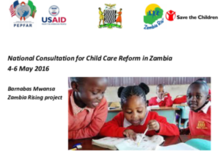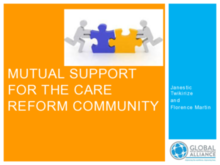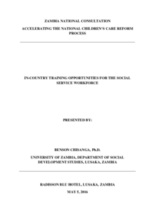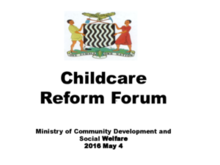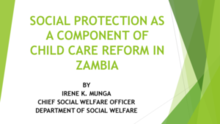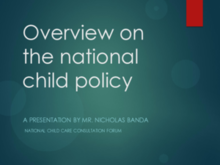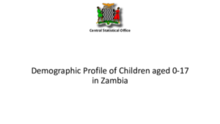Displaying 571 - 580 of 1028
This presentation by the Ministry of Community Development and Social Welfare, given at the Zambia National Consultation to Accelerate Care Reform, presents a situational analysis of children with disabilities in Zambia and explains why disability should be at the core of care reform.
This presentation from Fr. Robert Sihubwa, Chairperson of the Zambia Association of Child Care Workers, given at the Zambia National Consultation to Accelerate Care Reform, provides an overview of the status of child care workers in Zambia and their role in, and contributions to, care reform.
This presentation by Amy Bess & Janestic Twikirize of the Global Social Service Workforce Alliance (GSSWA), given at the Zambia National Consultation to Accelerate Care Reform, presents a working paper by GSSWA and BCN on the role that building the capacity of social service workers has in reforming child care systems.
This presentation from the Zambia Rising project, given at the Zambia National Consultation to Accelerate Care Reform, highlights the two key challenges facing Zambia’s social work workforce that Zambian delegates have identified and outlines strategies for social workforce strengthening based on an HR assessment and gap analysis.
This presentation by Janestic Twikirize and Florence Martin of the Global Social Service Workforce Alliance (GSSWA) and Better Care Network (BCN) respectively, given at the Zambia National Consultation to Accelerate Care Reform, describes the work of both organizations and highlights the importance of mutual supporting in advancing care reform efforts.
This presentation from Benson Chisanga, of the University of Zambia’s Department of Social Development Studies, given at the Zambia National Consultation to Accelerate Care Reform, provides basic information on opportunities for the training of the social service workforce in Zambia, focusing on levels of training, challenges, and future prospects.
This presentation from Zambia's Ministry of Community Development and Social Welfare, given at the Zambia National Consultation to Accelerate Care Reform, provides an overview of alternative care in Zambia, the CIF Initiative, prevention and response services, progress, strengths, opportunities, and challenges.
This presentation from the Department of Social Welfare, given at the Zambia National Consultation to Accelerate Care Reform, describes the Zambia Law Development Commission and its work, discusses the need to integrate social protection with child protection to meet the needs of vulnerable children and families in Zambia.
This presentation from Nicholas Banda, given at the Zambia National Consultation to Accelerate Care Reform, outlines Zambia’s vision for child policy, covering child survival rights, child development rights, child protection rights, monitoring and evaluation, and institutional framework and implementation.
This presentation from Zambia's Central Statistical Office, given at the Zambia National Consultation to Accelerate Care Reform, provides data on children in Zambia, including the legal definition of a child, how many are living in Zambia, where they live, and their living arrangements.

